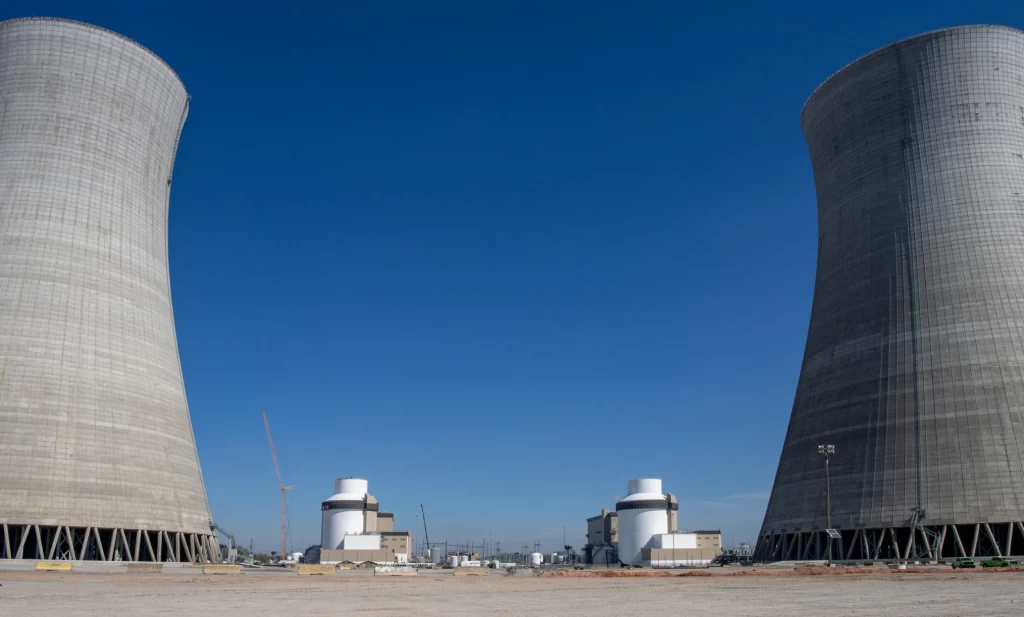By Emma Hurt, Axios Atlanta —
Georgia Power bills will grow several times, for several reasons, over the next few years.
Driving the news: The utility is asking the Public Service Commission to let it charge 2.7 million customers $16 more monthly to cover higher fuel costs.
- “Just as Georgians paid higher prices at the gas pump in 2022,” natural gas cost the company three times more, it said.
- If the commission approves the request next week, the hike will take effect June 1.
Yes, but: That’s not the only bill increase on the horizon. The Southern Environmental Law Center (SELC) estimates customers could see $45 more per month by the end of 2025.
- Another $16 per month will eventually hit thanks to last year’s regular rate increase to fund new grid investments.
- Plus, SELC estimates eventually, an additional $14 will be added on to cover the construction costs of nuclear power Plant Vogtle.
Why it matters: “I don’t think Georgia Power’s customers have experienced such a significant increase, several of them bundled together, in such a short period of time,” Liz Coyle, executive director of consumer advocacy group Georgia Watch, told Axios.
- More than 240,000 Georgia Power residential customers had their power cut off in 2022 for nonpayment.
Threat level: Atlanta resident Mildred Daniels testified earlier this month in protest. “We have no choice,” she said. “Georgia Power is our only option. Either we pay skyrocketing bills, or we will be in the dark.”
What they’re saying: The fuel recovery timing is tough, Public Service Commissioner Tim Echols acknowledged to Axios. “All of this is a delayed reaction to things that have already happened,” Echols said of the already-paid fuel and Vogtle costs.
- “All of it is now coming at the same time, which has the commissioners really scrambling and looking for ways to give some bill relief to customers,” he said.
Worth noting: Georgia Power spokesman John Kraft highlighted the company has adjusted its original fuel request down from $23, which it does not earn profit on, and agreed to extend the recovery period to three years.
- Echols also pointed to an increased senior discount and new smart meters to give customers more opportunities for energy efficiency.
The (very) big picture: Protests at the commission, ranging from fuel recovery to Vogtle, often existentially target how elected commissioners regulate the investor-owned monopoly utility.
- Advocates tend to argue commissioners could push back on the company and knock down its more than 10% rate of profit.
- But there’s a wide gap in “power differential” between the company and the commission staff and advocates who testify, SELC’s Whitfield said.
The other side: Echols countered the company has performed “at a high level” in reliability and customer service and should therefore be rewarded.
- “I haven’t felt like [Georgia Power] needed to be in time out, or they needed to be punished.” If that changed, he said, “appropriate action” would be taken.
- “There’s a lot of really good things happening on our Georgia grid now, but it’s not free to do all that stuff,” he said. “And unfortunately these upgrades are coming all at the same time.”
What’s next: The commission will discuss fuel recovery in a Thursday committee ahead of a May 16 decision.

Catch up quick: Plant Vogtle
Plant Vogtle’s Units 3 and 4, the first new nuclear reactors built in the U.S. in decades — and likely the last — were originally supposed to go online in 2016 and 2017 in Waynesboro.
What’s happening: Following the bankruptcy of Westinghouse, its original contractor, a cascade of delays followed for the complicated project. But Unit 3 is finally expected to go into service this summer, with Unit 4 close behind.
- The project is now more than double its original budget — at more than $30 billion.
Once the units go into service, Georgia Power will ask the Public Service Commission to approve the “prudency” of the costs it incurred to build the units — and thereby pass those costs onto customers retroactively.
- The SELC projects that could mean $14 more on bills per month.
Between the lines: Coyle with Georgia Watch says this makes the fuel recovery “doubly insulting” because had Vogtle’s units been working on time, the company wouldn’t have had to buy as much natural gas.
- “People should not have to pay double because the company has not been able to get this project delivered on time,” she said.
- During the “prudency hearings” for Vogtle, the commission could rule that some of those fuel costs be clawed back, Coyle suggested.
Be smart: Criticism of Vogtle often centers on Georgia Power’s guaranteed profit, which it earns on top of the total cost of capital projects like Vogtle.
- “In what other field would a company earn extra profit for not coming in on time and on budget?” Coyle said.
Copyright © 2023 Axios


